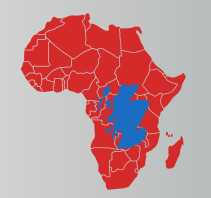and Activities
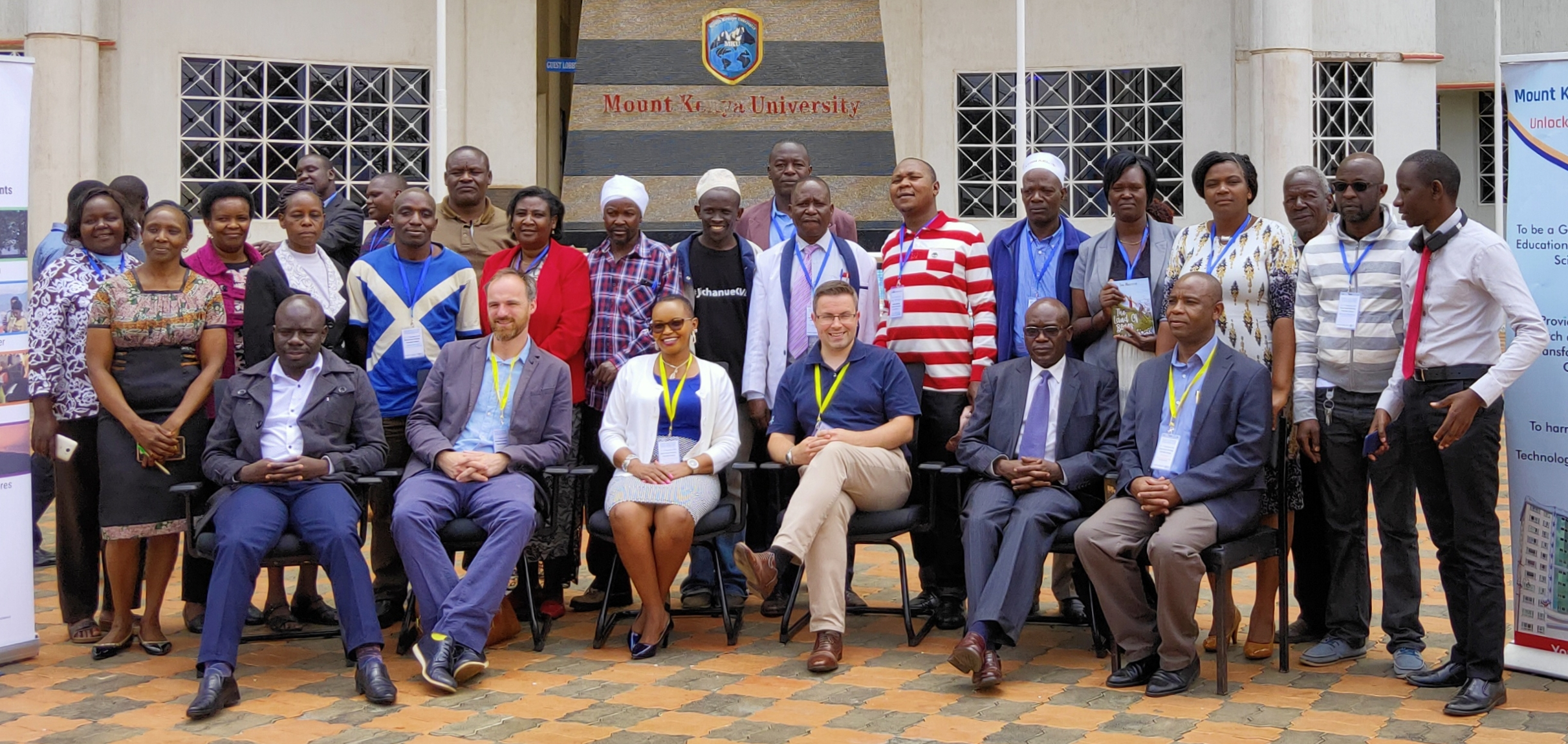
We have taken part in a range of research, training, speaking, and international consultancy in the past. Some of these activities have been carried out individually, some as a part of larger collaborative teams, including domestic and international partners such as Mount Kenya University (MKU) and University of Rwanda, (UR). A selection recent activities are outlined in brief below.
2023
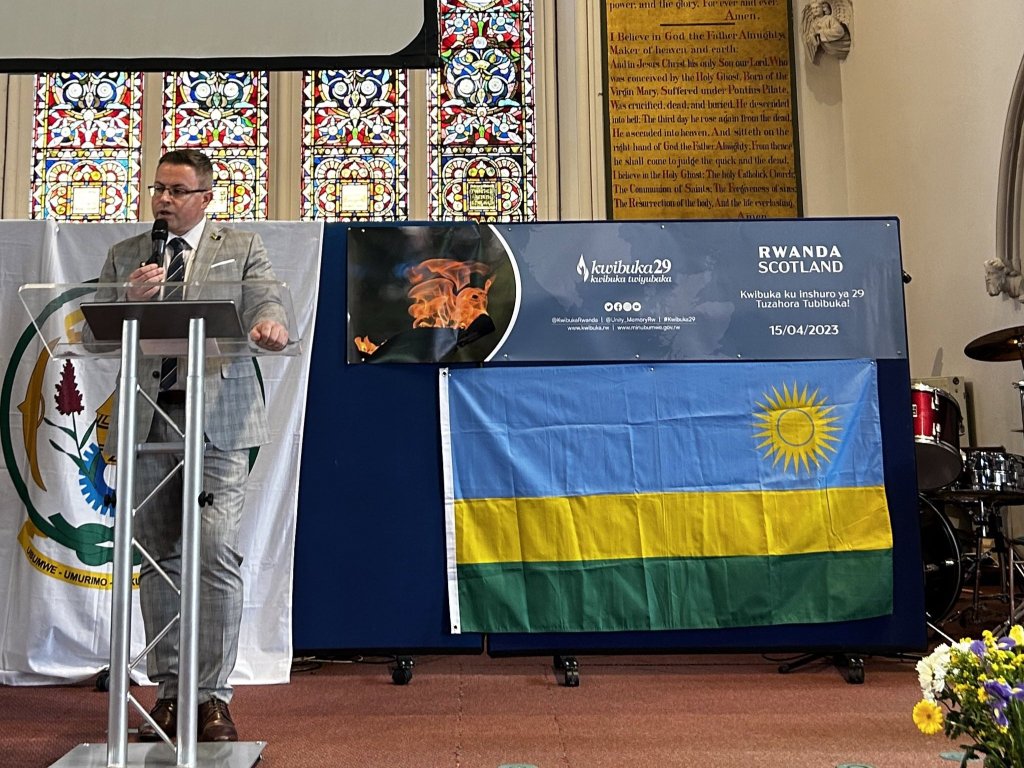
Kwibuka 29 – Glasgow, Scotland
On 15th April 2023 Dr Allan T. Moore was invited to speak at the Scottish event to mark Kwibuka 29, the 29th annual commemoration of the genocide against the Tutsi in Rwanda on 15th April 2023. The commemoration was attended by Rwandan diaspora living in Scotland and friends of Rwanda. Dr Moore spoke on the subject of ‘Memory and Truth’.
Several other important speeches and presentations were made during the event including by His Excellency Johnston Busingye – Rwandan High Commissioner to the UK, Dr Callum Henderson – Honorary Consul of Rwanda to Scotland, Joanna Keating – Head of International Development: Scottish Government, and Kirsty Robson from the Holocaust Memorial Day Trust. There were further important aspects of the event including spoken word poetry, survivors’ testimonies, and a candle lighting ceremony.
Rwanda’s gacaca courts and the discovery of mass graves
This book chapter, authored by Dr Julia Viebach, Dr Denis Bikesha and Dr Allan T. Moore was published in the textbook ‘Mass Graves, Truth and Justice – Interdisciplinary Perspectives on the Investigation of Mass Graves’ (Edited by Dr Ellie Smith and Professor Melanie Klinkner). In the chapter, there is analysis of the place of Rwanda’s Gacaca courts that were conducted in the 2000s-early 2010s in the discovery of mass graves and recovery of human remains. There is further discussion of culture and rituals surrounding the issue of death and bodies in the aftermath of the 1994 genocide against the Tutsi.
The textbook itself is described by the publisher in the following terms:
“Across the world, mass graves, often containing a multitude of human remains, are sites of human loss, suffering and unimaginable acts of cruelty. While no one mass grave or its investigation is the same, all mass graves contain evidence that is essential to the realisation of justice and accountability goals for victims, affected communities, states in transition and the international community.”
You can purchase the textbook here
2022
Public Health, Technology and Social Context in Rwanda’s COVID-19 Response
This book chapter in the Routledge Handbook of Law and the COVID-19 Pandemic (edited by Dr Joelle Grogan and Dr Alice Donald) was authored by Dr Denis Bikesha (UR) and Dr Allan T. Moore. In the chapter, there is an examination of the inception and development of Rwanda’s official COVID-19 response from the perspectives of constitutional law, criminal law, human rights, technology, sociology and history.
The textbook is the authoritative academic text on international and domestic legal responses to the COVID-19 pandemic, covering not only doctrinal legal responses, but also a full range of intersections between law and human rights, politics and governance, sociology, technology and other key areas. You can purchase the textbook here.
2021
Commonwealth Youth Peace Ambassadors Network (CYPAN) – The Gambia
In September 2021, Dr Allan T. Moore was invited to speak at the ‘Dialogue on International Peace Day’ event held by CYPAN – The Gambia. The remit of the speech was to illustrate how peace and security relate to justice, governance and democracy in both international and country-specific contexts.

2020
International Young Women Mediation Forum
In 2020, Dr Allan T. Moore spoke and took part in training activies designed to assist in the development of young women involved in high level mediation activities from around the world at the International Young Women Mediation forum, held in Nairobi, Kenya. This four-day programme was hosted by the International Centre for Peace, Human Rights & Development in Africa (IPHRD) and supported by GIZ.
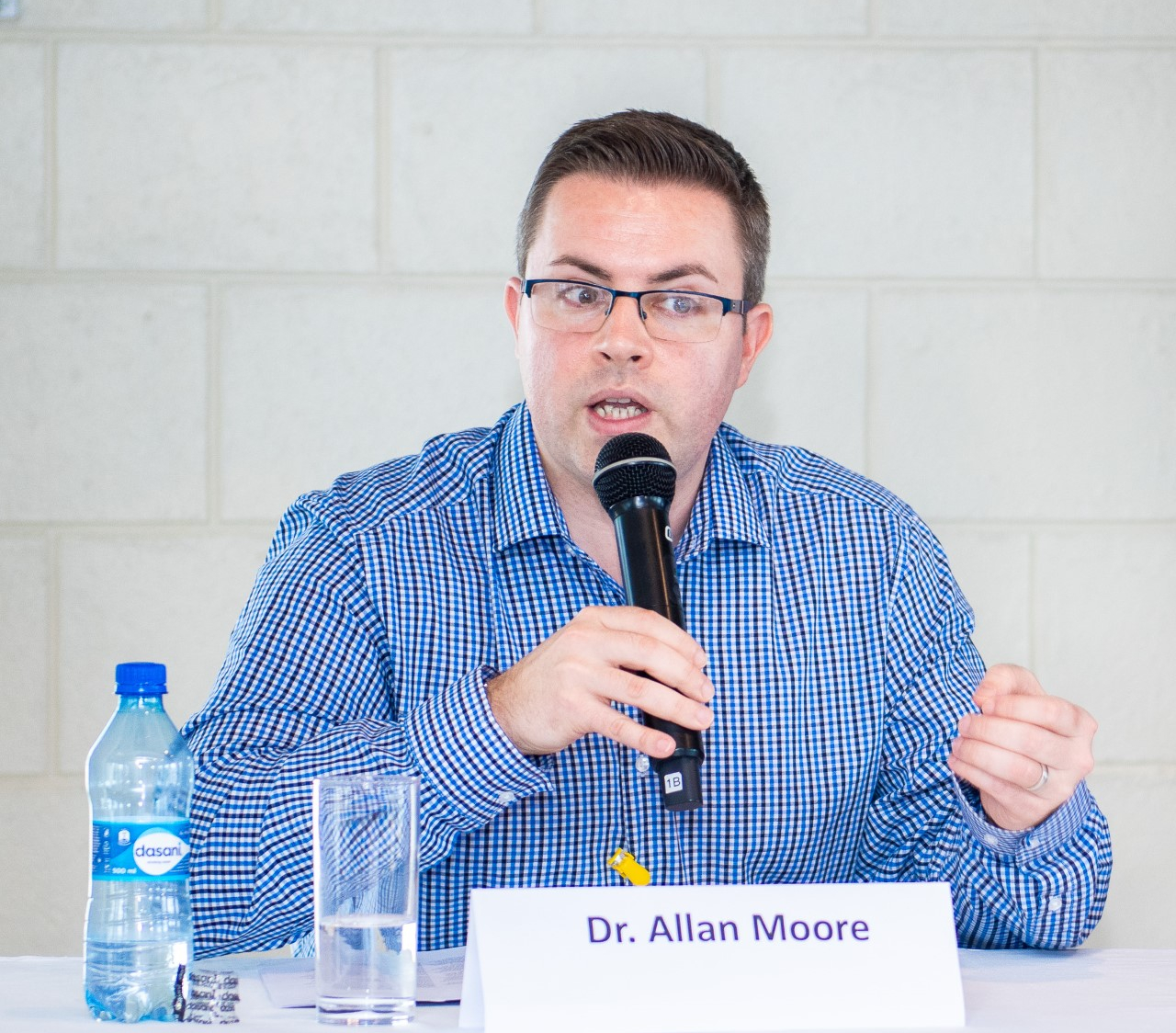
Dr Moore spoke on two panels during the programme; ‘The Role of Creative Tools and Art in Peacemaking and Peacebuilding’ & ‘Art for Reconciliation and Conflict Transformation’, giving practical examples from work he has been involved in over the past five years in these areas. IPHRD produced a short summariy video which gives the viewer a flavour of proceedings.
2019
Cultural Heritage for Inclusive Growth-Thika
In September 2019, a team led by Professor Gayle McPherson, and including Dr Allan T. Moore from University of the West of Scotland (UWS) collaborated with a team from Mount Kenya University (MKU) to deliver training to approximately a hundred delegates from across the arts and cultural heritage sector from around Nairobi, with the training conducted in the Senate room (and other breakout spaces) at MKUs main Thika campus. This training was part of a British Council Kenya project which the UWS / MKU partnership was contracted to perform between 2018 and 2019. The British Council prouced a short video that introduces the project:
Delegates included County cultural officers, visual artists, performing artists, poets, authors, and a host of individuals from third sector organisations including CSO and NGO representatives. Training was carried out through plenary presentation and small group workshop sessions, with delegates gaining and then later in the week demonstrating practical skills and applied learning.

If you would like to explore more about the British Council Cultural Heritage For Inclusive Growth project, search for the hashtag #culturegrows on Twitter where there are links to the work carried out by all project partners, as well as photos and videos showing activities over the duration of the project.
Cultural Heritage for Inclusive Growth-Mombasa
A similar training programme to the one conducted in Thika was completed in Mombasa in November 2019, also as part of the UWS / MKU British Council #culturegrows project. This was amended with new content and tailored training elements to the Mombasa context and in line with the different delegates that registered. In Mombasa we trained approximately seventy participants, again from across the spectrum of the arts and heritage sector.

Part of this programme was desinged around a field trip to Fort Jesus, located at the old port of Mombasa. This UNESCO World Heritage Site has a large number of aspects of culture, arts, and historical that are prime for study and exploration in terms of their ability to be harnessed to foster either division or cohesion amongst Kenyan citizens. Participants learned how culture is researched, categorised and communicated. Important dialogue was facilitated on who controls the narratives associated with culture, use of cultural space, and how the past can still have influential effects on the present.

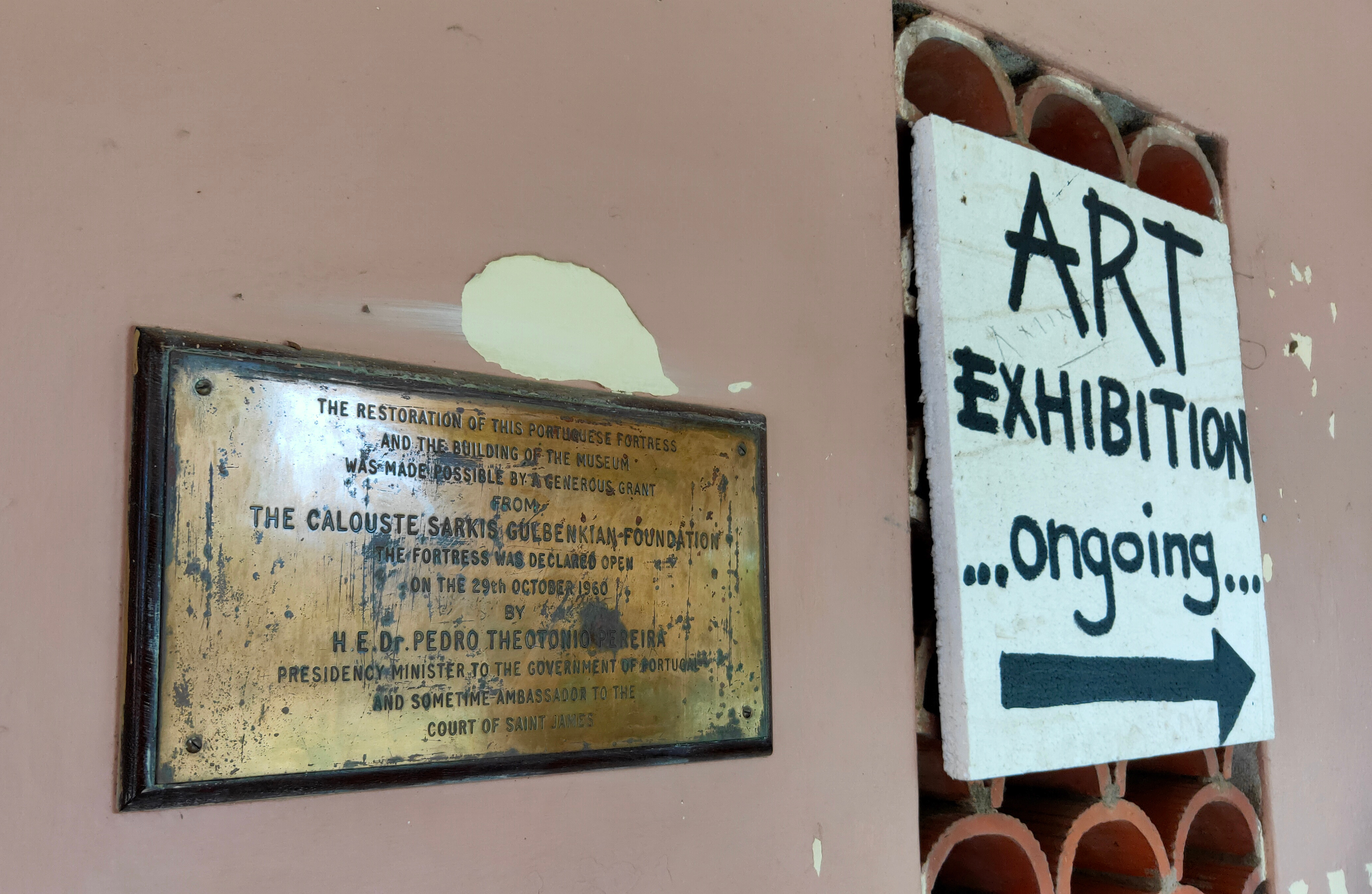

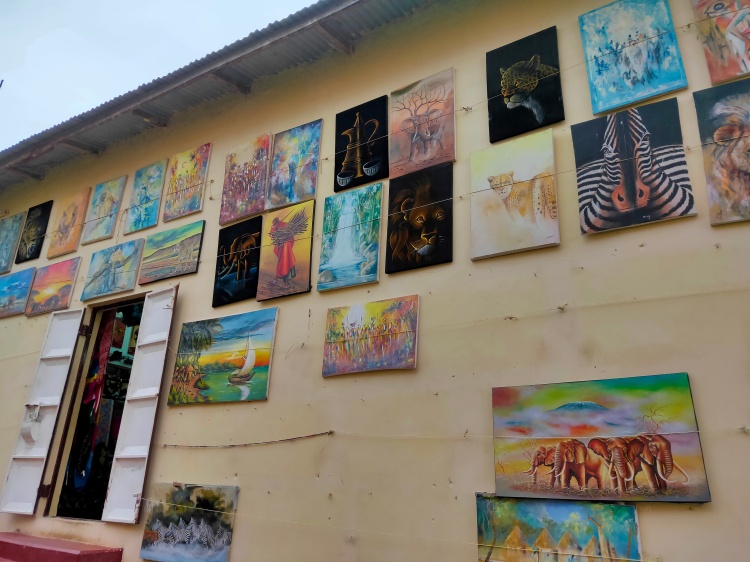
The base for this training programme was at MKUs Mombasa Campus, located only a few minutes away from Fort Jesus. At the end of the programme, all participants were encouraged to wear cultural clothing and in groups, created cultural performances and presentations to showcase the knowledge and skills they had acquired throughout the training.
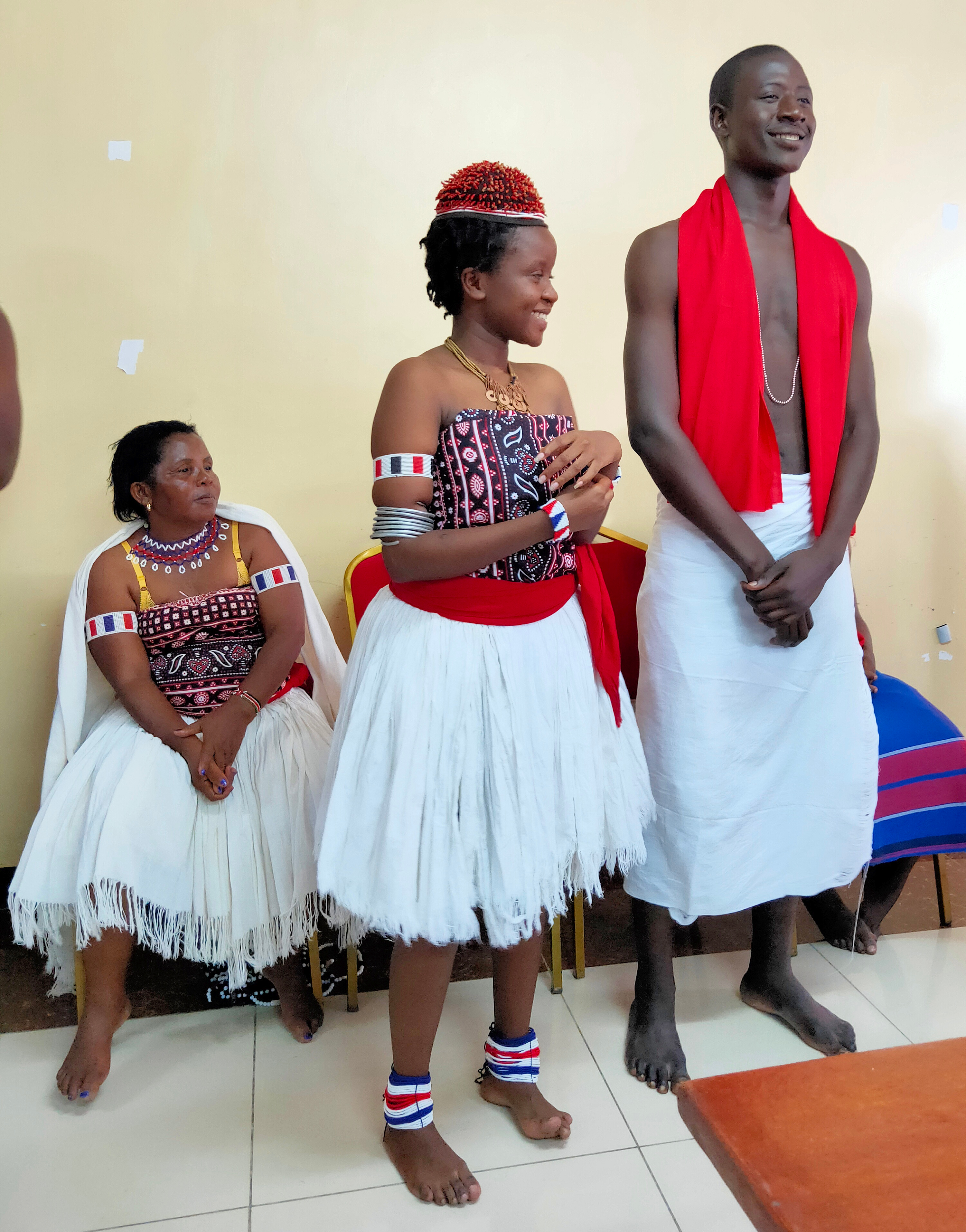
At the conclusion of the training programme, the UWS / MKU partners produced a final report for the British Council containing results and recommendations. This report can be downloaded here:
9th International Conference on peace and security in the Great Lakes Region
In May 2019, Dr Allan T. Moore presented on ‘Arts and Culture: Tools of Peace in Rwanda’ at the 9th International Conference on Peace and Security in the Great Lakes Region, in Kigali, Rwanda. This conference was organised by the University of Rwanda, and hosted at the Kigali Conference and Exhibition Village. The paper presented was based on research conducted during 2018 related to the role of the arts and culture to global security and stability, updated and amended with more detail specific to Rwanda.

The PowerPoint that was used to accompany the presentation can be downloaded here:
The presentation covered Rwandan cultural traditions and initiatives including Kwibuka, Ndi Umunyarwanda, Itorero, and Ubumuntu. Detailed conclusions were given on how the arts and culture can be harnessed as part of peace and security strategies in the Great Lakes Region of Africa.
Kwibuka 25 – The Hague
Dr Allan T. Moore was invited to speak at the Kwibuka 25 conference at the Peace Palace, part of the International Court of Justice, in the Hague. This conference was the official Netherlands commemoration of 25 years since the Genocide against the Tutsi in Rwanda, organised and facilitated by the Embassy of the Republic of Rwanda to the Netherlands. The main theme of the event was ‘What lessons have been learned from Rwanda in prevention and responses to Genocide globally?’. Dr Moore was invited to speak at the conference on the subject of ‘Reconciliation through citizen participation in governance’.


The content of Dr Moore’s speech has been further developed in order to be published as a book chapter for an edited volume stemming from this conference edited by Dr Felix Ndahinda.
2018
The Contribution of Arts & Culture to Global Security & Stability
A team from UWS, led by Professor Gayle McPherson, were commissioned by the British Council to research and give recommendations on how the arts and culture contribute, and have the potential to contribute, to global security and stability. In this report, we adopted a case study approach with three test jurisdictions – Columbia, Rwanda, and Syria, and interviewed stakeholders from each region. Dr Allan T. Moore conducted the majority of the research related to Rwanda.
The British Council published ‘The Art of Peace’ an abridged output based on the UWS report, and launched it in July 2019 at the Global Strategy Forum in Whitehall. The work has created significant international impact, as by invitation of the British Council it was the key intervention of the EUNIC Global and Ministry of Culture, Education and Youth knowledge sharing workshop in Cyprus in 2019. They have adopted the recommendations from our research and are currently (as of 2020) in the process of developing strategy for implementation in twelve target countries.

The full report authored by Professor Gayle McPherson, Dr Sophie Mamattah, Dr Allan T. Moore, Greis Cifuentes, and Yara Moualla, can be downloaded here:
2017
International Conference on Peace, Security, and Social Enterprise, Nairobi
The Institute of Security Studies, Justice and Ethics at Mount Kenya University facilitated this international conference at the Safari Park Hotel near Nairobi in May 2017. Dr Allan T. Moore was invited to chair the session on Peace, Governance & Political Processes, and act as a judge on the panel for deciding the best paper prizes from the event.
In addition to these official roles, Dr Moore presented a paper on ‘Strategic planning for durable peace: The role of effective disarmament, demobilization, and reintegration of ex-combatants as part of the process, and lessons to be learned from MDRP and TDRP in the Great Lakes Region’.

While on this trip to Nairobi, Dr Moore also held discussions with MKU Schoool of Law regarding potential future collaboration potential and visited the Law campus in Parklands, speaking with the Dean of School and other senior colleagues.

2015
Veritas Forum: It’s Not Fair – InterVict, Tilburg
Dr Allan T. Moore was invited to speak at the Veritas forum, held at the International Victimology Institute (InterVict) in Tilburg University, the Netherlands, in April 2015. The purpose of the forum was to explore issues of how societies deal with injustice and unfairness, using the ongoing reconciliation efforts in Rwanda following the 1994 Genocide against the Tutsi as an example. Dr Moore was invited to speak on two subjects, ‘what to victims need from justice?’ and ‘the role of faith in justice’, using his experience in Rwanda as a case study. The full proceedings were recorded, and a short video produced that gives the viewer an understanding of the nature of the forum. This video can be viewed here:
